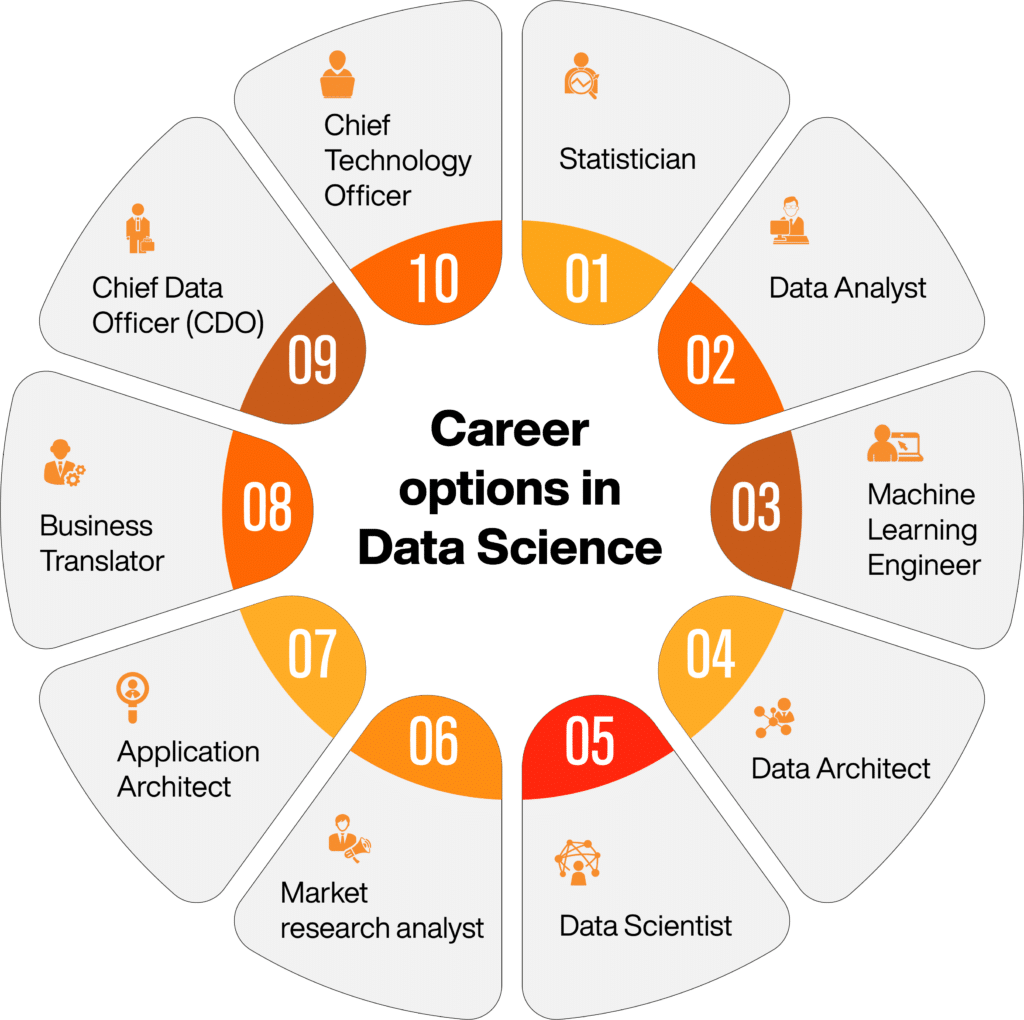There are about 80 billion population in the world, and every person is performing some activity daily that means generating data. So massive data are generated in a day as you go shopping, as you visit somewhere, as you get sick, or any other activity. So data is crucial for businesses, the government, researchers, or any other institution.
Data science is everywhere; if you think that data science is hard to learn, that is not true. It is very easy to learn, like completing a bachelor’s degree.
A true story of mine
I am Aman Matolia, and I remember when I first did a Google search on What is data science a few years ago. I completed my Bachelor’s degree in Biotechnology from Mumbai University. After that, the next is to complete the master’s degree, so I had taken admission to the MBA program.
I am actively surfing the internet daily; I founded Everywhere in online Data science or AI. When I was visiting YouTube or any websites everywhere on the internet, the Data science ads showed me. I know that time this was the magic of the algorithm, but I don’t know how all these things are appearing. My curiosity was increasing to know how all these things happened. So I searched and understand what exactly Artificial Intelligence and machine learning, and all about.
My interest is amazingly growing in AI; after some time, I finally Enrolled in the Python courses. The Python courses are easy, and next, I buy a Data Science course. The institute charges $1460 for a 6-month course but my capacity to learn all this within three months. I can’t do anything, so I started my journey to the world of AI.
I learned statistics at school time, but really at that time, I didn’t know how to use it in real life. In the first lecture, the instructor teaches a brief introduction to AI and Data Science and the second is Statistics and probability. After learning statistics, I learned the importance of statistics and probability. The instructor gave many exercises in different domains like predicting the Titanic accident data, predicting drug efficiency, Call center data, contamination of food, Amazon recommendation of the product, Sentiment analysis, and many more.
You can say me an Intermediate in Data science. Data science is a vast field where learning has no limits, so we have learned lifetime the new technologies. I promise you that I will teach you free Data science courses worth $2000 and also how to get a job. So follow or subscribe to the Shitus. Soon I will announce the Ultimate Data Science courses.
What is Data Science
Data science is a branch of AI that applies the concepts of Maths, Statistics, and a programming language in data and concludes the valuable information that helps make a business decision. Data science uses a machine-learning algorithm to develop predictive models.

Need for a Data Science
Suppose you are a Data scientist of a small retail store(like General, Cloths, or any), the average customer depending on the day, month, and season. So assume 100-500 average customers daily, during holidays 250-800 customers a day and depends on location, and month. Daily your shop generates sales data. You can maximize your profit by identifying the hidden pattern in sales like Which month sales getting high, product to stock, Product offers, Who is buying the product, Recommended other products, and many more.
Walmart, Amazon, Flipkart, YouTube, and Instagram are generating billions of data daily. So they have their own data scientist team that will identify the pattern and a perfect decision. When any offers are launched by companies, they will first analyze the data and decide whether the offer is helpful. So Data science is essential in the 21st century.
In one minute there are billions of data are generated online.
Promising career
In 2020 there is a massive demand for data science. There are many vacancies available on Linkedin, Naukri, Glassdoor, or other job portals. Many companies say that data science is a promising career like “The Next White Hot Career- Forbes“, “Data Scientist: The Sexiest Job of the 21st Century-Harvard “, etc. According to Payscale, the average salary of Data science varies on the location in the USA is $96501/yr according to Payscale, Europe is € 60,280 / yr according to Glassdoor, and India is 550000/yr according to Glassdoor. So if you are unemployed or looking for an opportunity, data science can give you the high package.
Application of Data Science
Data science is everywhere, and some industry is as follows:
Retail & E-commerce
A lot of competition in the retail industry like Walmart, Amazon, and Kroger.co, Costco, etc., when you visit Walmart or any other store, observe the positioning of the product, discount offers, and the most famous offer is “Buy one get one for free” This is all done by Data Science.
Healthcare
The healthcare industry uses data science in several ways like Drug efficiency, Medical imaging, Genomics, monitoring patient health, and many more.
Transportation
You are using Google Maps; you know the thing behind it. Google Maps collects the data and predicts the traffic.
Education
Numerous EdTech startups develop their own learning management system. We can get a dozen of information like teaching experience, the number of students, student interest, student goal, student demographic, and many more.
Manufacturing Industries
Manufacturing industries are immense, so there are many responsibilities and research for the product. work like prevention Maintenance and fault prediction, Price optimization, Automation, and Robotization in the Smart Factory, Supply Chain Optimization, Product Design and Development, Inventory Management and Demand Forecasting, etc
What Does a Data Scientist Do?
Data scientists are present in almost all organizations. They’re well-rounded, analytical wizards who build complex algorithms, organize mountains of information, and translate it into strategies that drive business decisions.
- R
- Python
- Apache Hadoop
- MapReduce
- Apache Spark
- NoSQL databases
- Cloud computing
- D3
- Apache Pig
- Tableau
- iPython notebooks
- GitHub
What Skills required to become a Data Science
1. Analytical Skills:
- What It’s About: Think of data as a treasure map. You need the knack to analyze, interpret, and draw meaningful conclusions from it.
- Why It Matters: Data is just a jumble of numbers without the ability to extract insights.
2. Math and Statistics:
- What It’s About: The backbone of data science. Think algebra, calculus, and statistical methods – your trusty sidekicks.
- Why It Matters: To build robust models and understand the language of data.
3. Programming Skills:
- What It’s About: Master the art of coding, especially in languages like Python and R.
- Why It Matters: Coding is your wand; it lets you conjure algorithms and breathe life into data.
4. Data Cleaning and Wrangling:
- What It’s About: Turning messy data into something pristine. It’s like tidying up your room, but with spreadsheets.
- Why It Matters: Clean data means accurate insights.
5. Machine Learning:
- What It’s About: The magic behind predicting future trends. Learn algorithms, model building, and how to make your computer think.
- Why It Matters: Predictive power – the crystal ball of data science.
6. Data Visualization:
- What It’s About: Transforming complex data into easy-to-understand visuals using tools like Tableau or Matplotlib.
- Why It Matters: Communicate your findings effectively; a picture speaks a thousand words.
7. Communication Skills:
- What It’s About: Explaining complex concepts in simple terms. You’re the translator between tech wizards and everyday folks.
- Why It Matters: Your insights are worthless if no one understands them.
8. Domain Knowledge:
- What It’s About: Understanding the industry you’re diving into – whether it’s finance, healthcare, or rocket science.
- Why It Matters: Tailor your data solutions to the specific needs of your industry.
9. Curiosity:
- What It’s About: The desire to unravel mysteries. Ask questions, dig deep, and don’t settle for the obvious.
- Why It Matters: Curiosity fuels discovery; it’s the driving force of data exploration.
10. Continuous Learning:
- What It’s About The data world evolves fast. Stay updated on the latest tools, techniques, and industry trends.
- Why It Matters: To stay relevant and keep your data wizardry at its peak.
Must-Know Machine Learning Algorithms
- Linear Regression: Predicts a numerical value based on historical data. Think of it as drawing the best-fit line through a cloud of points.
- Logistic Regression: Classifies data into two categories (yes/no, 0/1). It’s like the sorting hat of machine learning.
- Decision Trees: Maps decisions in a tree-like structure. It’s your flowchart for making choices based on conditions.
- Random Forest: A forest of decision trees working together. It’s like having a council of wise trees making decisions.
- Support Vector Machines (SVM): Finds the best line (or hyperplane) that separates data into different classes. It’s your boundary creator.
- K-Nearest Neighbors (KNN): Classifies a data point based on the majority class of its k-nearest neighbors. It’s like making friends with the neighbors.
- K-Means Clustering: Groups similar data points into clusters. It’s the organizer of the data party.
- Naive Bayes: Calculates the probability of an event based on prior knowledge. It’s not as naive as it sounds.
- Neural Networks (Deep Learning): Mimics the human brain using layers of interconnected nodes. It’s the powerhouse of complex tasks.
- Principal Component Analysis (PCA): Reduces the dimensionality of data while preserving its important features. It’s like condensing information without losing much.






